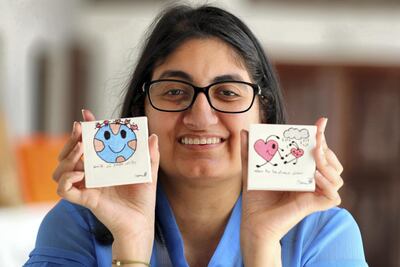A is for antibodies, B is for blood test, C stands for Covid-19: this is how an Emirati artist with autism reimagined learning the alphabet during the pandemic.
Abdullah Lutfi captured the lives of UAE residents as they dealt with home schooling, isolation and fake news about the virus.
He is known for his distinctive monochrome paintings, and the large canvas is filled with figures in kanduras and abayas.
The engaging work illustrates other aspects of the tumultuous past year, depicting toilet rolls, which were in great demand globally at the start of the outbreak, and representing the upheaval of job losses.
Lutfi, 27, said his favourite sketches are M for “mask”, W for “work from home” and Z for “Zoom bombing”.
His art teacher Gulshan Kavarana helped him to complete his latest work.
Lutfi was among several artists left without a place to work when Mawaheb, a studio for adults with special needs, closed last year.
Tashkeel, a gallery in Nad Al Sheba, Dubai, stepped in and gave Lutfi and another artist, Asma Baker, somewhere to work.
The new studio, called Next Chapter, is in Al Fahidi historical district.
It was inaugurated last month by Noura Al Kaabi, the Minister of Culture and Youth, and Hessa Buhumaid, the Minister of Community Development.
Lutfi is thrilled to have space in which to develop his skills.
"It's so good to get back to work in our new studio. I'm happy here," he told The National.
He pointed to canvases he had completed and said he hoped to earn commissions soon.
“The money goes only to me when I sell my work,” he said.
“I am going to save my money for a new car – a Dodge Challenger with a heavy engine, which is a muscle car.”
Kavarana has worked with Lutfi for more than a decade.
“We look for the words together and think of images,” she said.
“Painting has given him a lot of understanding and perspective of the Covid situation. We have tourists coming in with children and it gives them a good understanding too.
“Abdullah didn’t always understand when people talked about the vaccine, but now he does. We talk about it and he draws it.”
Lutfi, who has held solo exhibitions in the country, is working on a collection for a show in Japan.
Baker, 32, presented the UAE ministers with rings she designed.
She also writes stories and poems, and will share them at a community event in Ras Al Khaimah this month.
“I like painting, drawing, making jewellery – it makes me feel at peace with the world,” Baker said. She has an autism spectrum disorder which affects social interaction and communication.
“I like writing. With this new studio, we are looking forward, not looking back.”
Her mother, Sana, said that since the lockdown was eased, Asma has met a few friends from Mawaheb every Thursday to play games, watch TV and read stories.
“We don’t want her to be alone again. She used to be very shy before Mawaheb. Now she is more sociable – she talks with everyone,” she said.
“We don’t want to lose that. We want her to stay engaged and that’s why this new studio is so important.”
Lisa Ball-Lechgar, deputy director of Tashkeel, described both artists as “shining lights” and welcome additions.
“Asma and Abdullah are now at the stage in their careers where they need to spread their wings and truly establish themselves as independent arts practitioners,” she said.
“Since moving to Tashkeel, they have quickly become a vital part of our community.
“The studios in the house they share with four other professional artists are a collective beacon of experimentation and collaboration in the heart of Al Fahidi historical neighbourhood.”
















